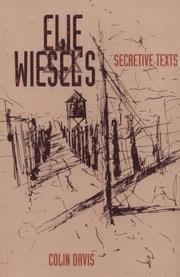Check nearby libraries
Buy this book

Elie Wiesel's fiction is rooted in his experience as a survivor of Auschwitz and Buchenwald. His work as a novelist has been accompanied by increasing involvement in human rights activities, for which he received the Nobel Peace Prize in 1986.
Working through some of the ethical implications of literary interpretation, Colin Davis examines the consequences of taking a modern critical perspective on Holocaust literature. With the notion of narrative secrecy fundamental to his study, he suggests that Wiesel's fiction is more darkly ambiguous and deeply complex than his stance on human rights issues.
Drawing on Wiesel's short stories, novels, and essays, Davis illustrates the disjunction between the uncertainties expressed in Wiesel's fiction and the polemical confidence of some of his nonliterary writing. He discusses tensions in the fiction in the context of the personal, theological, intellectual, and aesthetic traumas of the Holocaust.
He analyzes important themes in Wiesel's writing, such as madness, language and silence, and the death of the father, and links them in an original manner to the ideas of storytelling and of the loss of meaning. He ends the book by drawing some tentative conclusions about secrecy and interpretation through a consideration of Wiesel's most recent novel, The Forgotten.
- Davis acknowledges the risks involved in approaching Holocaust literature from the standpoint of fictional form. He writes, "By concentrating on hesitations and indeterminacies in Wiesel's writing, I do not for a moment intend to deny the awful reality of the Holocaust, or to detract from Wiesel's remarkable work as a human rights activist." While Wiesel's fiction is disturbingly enigmatic, Davis says, the pain on every page is radiantly clear.
Check nearby libraries
Buy this book

Previews available in: English
Showing 1 featured edition. View all 1 editions?
| Edition | Availability |
|---|---|
| 1 |
aaaa
Libraries near you:
WorldCat
|
Book Details
Edition Notes
Includes bibliographical references (p. 193-198) and index.
Classifications
The Physical Object
ID Numbers
Community Reviews (0)
Feedback?| July 14, 2024 | Edited by MARC Bot | import existing book |
| February 25, 2022 | Edited by ImportBot | import existing book |
| January 11, 2020 | Edited by ImportBot | import existing book |
| December 4, 2010 | Edited by Open Library Bot | Added subjects from MARC records. |
| December 8, 2009 | Created by ImportBot | add works page |










